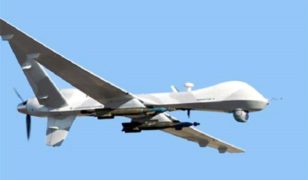Army is looking for additional contractor help for the Tactical SIGINT Payload (TSP) system
 On May 28, the Army Contracting Command issued a request for information (RFI) for interim logistics support for the Tactical SIGINT Payload (TSP) system (Solicitation Number: W56KGY14R0010). Responses should be submitted via email no later than June 8.
On May 28, the Army Contracting Command issued a request for information (RFI) for interim logistics support for the Tactical SIGINT Payload (TSP) system (Solicitation Number: W56KGY14R0010). Responses should be submitted via email no later than June 8.
The US Army Project Manager Sensors – Aerial Intelligence (PM SAI), in support of Product Manager, Sensors – Unmanned & Rotary Wing (PM SURW) is conducting a market survey to identify additional capable firms to provide Interim Contractor Logistics Support (ICLS) services for the Tactical SIGINT Payload (TSP) system. To perform this type of effort, replying firms are required to have a US Top Secret Facility Clearance with TS/SCI Safeguarding approvals to match the performance requirements. This RFI is issued solely for information and planning purposes only as defined in FAR 15.201(e) to obtain comments on preliminary requirement specifications. It does not constitute a Request for Proposal (RFP) or a promise to issue an RFP in the future. The lack of the submission of data at this time will not eliminate any firms’ participation in the future competition, if such a competitive contract is assessed as possible by the Government through its evaluation of information obtained though this market research.
The TSP system is designed for operations aboard the MQ-1C Gray Eagle Unmanned Aerial System, and is currently in the Production and Deployment phase, with deployment to selected Army units planned to begin late in the 3rd quarter of Government Fiscal Year 2016 (FY16). The TSP system is divided into two major components: the TSP airborne payload and a ground workstation (GWS). Depending on the type of unit equipped, the GWS element is implemented as either a standalone hardware and software solution, or as a software-only product that is integrated onto the Operational Ground Station (OGS) shelter’s workstations. The TSP airborne payload includes antennas, electronics, Global Positioning System /Inertial Navigation System, and crypto devices housed in a modified Standard Payload Interface Design and Integration (SPIDI) pod shell. The TSP payload requires power and data link interfaces with the aircraft. The pod will interface to the aircraft data link architecture to provide for downlink of payload products and uplink of payload command and control. The ground workstation provides the command and control for the payload and the receiving, display and exploitation of the SIGINT data collected. At this time, the Government does not possess a Technical Data Package or training materials for the TSP system. This data is currently available only from the OEM, BAE systems.
The specific requirements for which respondents must demonstrate their capability to perform and provide ICLS support services are:
1) Provide Field Service Representatives/Engineers (FSR/FSE) to support the TSP system while deployed to Army units in CONUS and within OCONUS theaters of operation. FSR hardware and software support tasks would include supporting the installation, checkout and removal of the TSP airborne payload on the MQ-1C Unmanned Aircraft System (UAS); Support the loading of crypto keys on the TSP payload and GWS; Perform troubleshooting, diagnoses and field repairs of the TSP system, to include providing real-time support to operational units during missions to execute corrective actions on rapidly recoverable errors/glitches; Provide formal New Equipment Training (NET) to units equipped in CONUS and within OCONUS theaters of operations to the TSP Operators and Maintainers; Provide quote mark over the shoulder quote mark training assistance to units during initial deployments and site activations, and when new TSP operator/maintainer personnel rotate into the units equipped; Provide TSP system hardware and software support for the installation and site activation of the TSP system and its ground control station at the unit(s) equipped; Collect field operation, reliability and logistics support data metrics for the TSP system (e.g., reliability metrics, LRU/SRU and component level failure rate metrics, maintenance metrics, etc.). FSR personnel must be cleared to TS//SCI with read-on to SI, TK, G, and HCS tickets to be able to work in all SCIF workspaces.
2) Develop and provide an interim contractor sustainment support infrastructure, which the Government intends to begin transitioning to an organic Army sustainment support infrastructure on/about October 2018, with full transition to organic Army sustainment support infrastructure completed on/about October 2019. This will overlap the ICLS support contract period of performance to facilitate an efficient transition between contractor ICLS sustainment support and organic Army sustainment support systems. Interim contractor sustainment support infrastructure and activities encompass the sustainment and support of all TSP system hardware and software and includes: Supplying spare parts for field and depot level repairs; Management of spare parts inventories and software baselines; Establishment of field and depot level repair facilities, to include special tools and equipment required to conduct TSP system diagnoses and repairs; Effect repairs of returned damaged/defective TSP systems, bringing them back to full operational capability and returning them IAW contractual turn-around time requirements; Support Configuration Management (CM) of the TSP system baseline, to include software patch management; Providing reach back to the OEM for technical support; Documentation of all failures, maintenance and repair activities, to include cost reporting, in accordance with applicable Army standards (e.g., DA2410s, DA2407s, 1352s, etc.).
Additional information is available here.
Source: FedBizOpps








